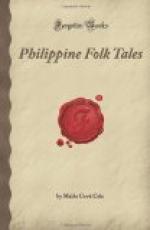“Friend shrimp, your face is turned the wrong way. What weapon have you to fight with the waves?”
“My weapon is a spear on my head,” replied the shrimp, and just then he saw a big wave coming and ran away. The crabs did not see it, however, for they were all looking toward the shore, and they were covered with water and drowned.
By and by the wives of the crabs became worried because their husbands did not return, and they went down to the shore to see if they could help in the battle. No sooner had they reached the water, however, than the waves rushed over them and killed them.
Some time after this thousands of little crabs appeared near the shore, and the shrimp often visited them and told them of the sad fate of their parents. Even today these little crabs can be seen on the shore, continually running back and forth. They seem to rush down to fight the waves, and then, as their courage fails, they run back to the land where their forefathers lived. They neither live on dry land, as their ancestors did, nor in the sea where the other crabs are, but on the beach where the waves wash over them at high tide and try to dash them to pieces.
Pronunciation of Philippine Names
The vowel sounds in the following pronunciations are those used in Webster’s dictionary.
Adasen, a-dae’sen Aguio, a’ge-o Alan, ae’laen Alokotan, ae-lo-ko-taen’ Aponibalagen, apo-ne-bae-lae-gen’ Aponibolinayen, apo-ne-bo-le-nae’yen Aponitolau, apo-ne-to’lou Bagbagak, baeg-bae-gaek’ Bagobo, ba-go’bo Balatama, bae-lae-tae’ma Bangan, baen’gaen Bantugan, baen-too’gan Benito, be-ne’to Bilaan, be-lae’an Bita, be’ta Bontoc, bon’tok Bukidnon, boo-kid’non Bulanawan, boo-la-nae’wan Caalang, kae-ae’laeng Cabildo, kae-bil’do Cibolan, ci-bo’lan Dalonagan, da-lo-na’gan Danepan, dae-ne-pan’ Dapilisan, da-pe-le’san Dayapan, di-a-pan Dinawagen, de-nae-wae’gen Dodedog, dog-e-dog Domayco, do-mi’ko Dumalawi, doo-mae-lae-we’ Epogow, e-po-gou’ Gawigawen, gae-we-gae’wen Gaygayoma, gi-gi-o’ma Gotgotapa, got-go-ta’pa Igorot, ig-o-rot’ Ilocano, il-o-kae’no Ilocos Norte, il-o’kos no’rte Indarapatra, in-dae-rae-pae’tra Ini-init, e-ni-e’nit Kabigat, ka-be-gat’ Kaboniyan, kae-bo-ne-yan’ Kadaklan, ka-dak-lan’ Kadalayapan, kae-dae-lae-yae’pan Kadayadawan, kae-dae-yae-dae’wan Kanag, kae’naeg Komow, ko’mou Kurita, ku-re’ta Langgona, laeng-go’na Ligi, le’ge Limokon, le-mo’kon Lumabet, loo-mae’bet Lumawig, loo-mae’wig Magbangal, maeg-baeng’al Magindanau, mae-gin-dae’nou Magosang, ma-go’sang Magsawi, maeg-sae-we’




